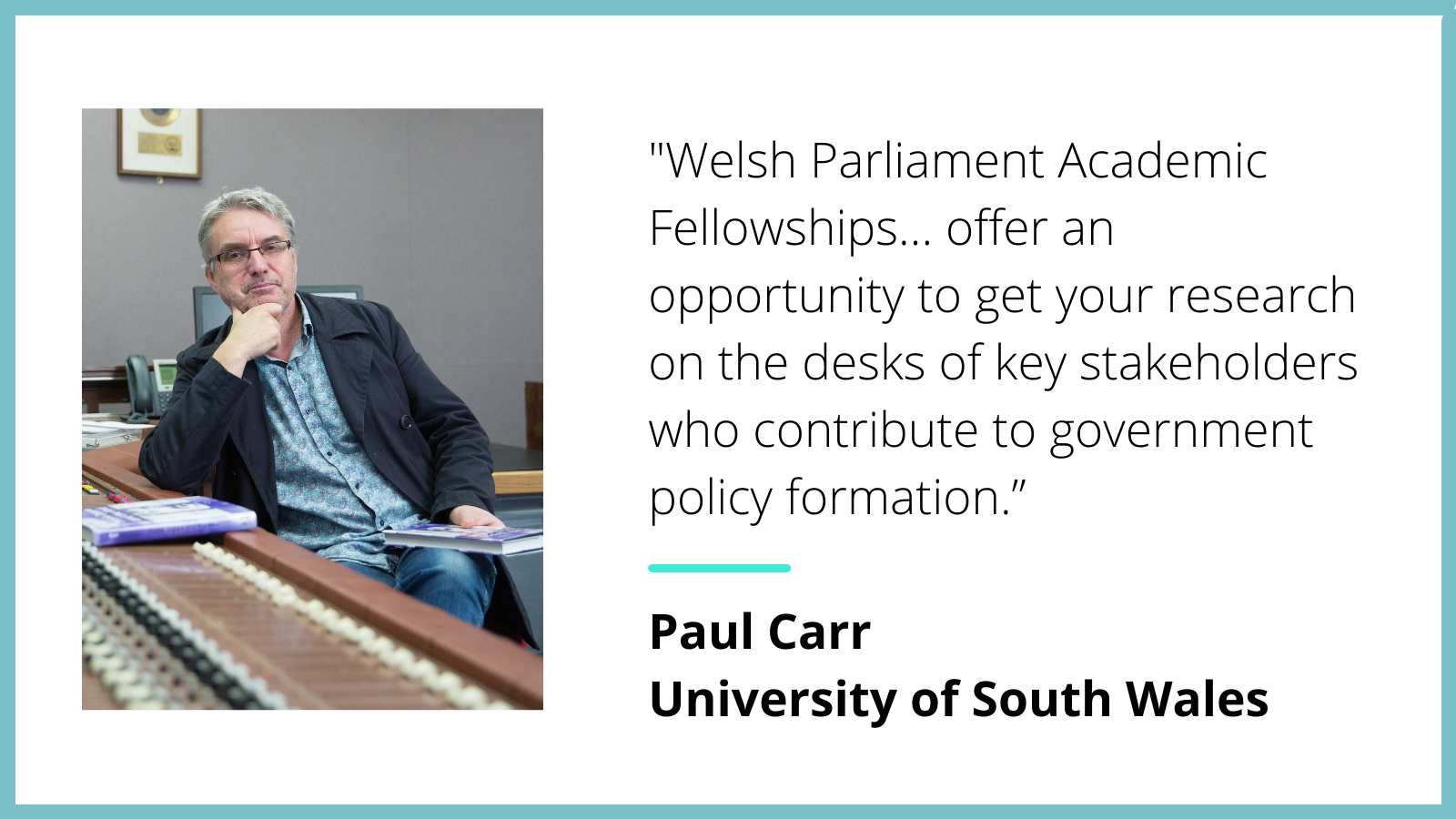Welsh Parliament Academic Fellowship: influencing policy to support post Covid-19 music industries in Wales
Posted 2021-06-08 08:36:43 by Paul Carr and Donna Szuran

Welsh Parliament Academic Fellowships give researchers an important voice in policymaking and offer an opportunity to get your research on the desks of key stakeholders who contribute to government policy formation.
Paul Carr is Professor in Popular Music Analysis at the University of South Wales and himself an experienced performing musician. In this interview with Donna Szarun, Knowledge Exchange & Impact Officer at University of South Wales he reflects on his experience as a Welsh Parliament Academic Fellowship.
What research were you commissioned to do, and why?
I was commissioned by the Senedd Research office at Welsh Parliament to document a report examining the 'state of play' in the post Covid-19 music industries in Wales. At the time the research was commissioned (July 2020), the live music industries across the world were at the start of arguably their biggest crisis in living memory, as they struggled to come to terms with the financial impacts of closed venues and social distancing restrictions. Based on detailed analysis of the strategic practices other nations were doing at the time, my research provided advice for the Culture, Welsh Language and Communications Committee (CWLCC) to consider, prior to them making recommendations to Welsh Government. Two months after my report was published, the CWLCC submitted their Turn up the Volume recommendations to Welsh Government (December 2020), with Welsh Government's official response published in February 2021.
Was this your first experience of engaging with policymakers?
No. Although policy research was not on my agenda when I completed my PhD nearly 20 years ago, it is something which has grown through the years, and in my experience offers an opportunity to genuinely operate in the middle ground between your chosen industry and government policy. I wrote my first report for the Welsh Music Foundation in 2011 and wrote a report on the decline of instrumental teaching in Wales for Rhianon Passmore MS in 2019.
What did you learn about policymaking within Welsh Parliament?
During the course of my Fellowship, I was able to track the complex chain of events that eventually resulted in actioned policy. This contains multiple overlapping and often competing narratives and it is important to accept that any impact an academic Fellowship produces, will often have other stakeholders feeding into it. Academics need to be aware that when making recommendations to Government, you are working in an environment of multiple agendas and voices —in my experience it is rare that a report recommendation will be the sole voice contributing to government policy. However, Fellowships do give researchers an important voice in policymaking and offer an opportunity to get your research on the desks of key stakeholders who contribute to government policy formation.
What were the highlights of your Fellowship?
The Fellowship gave me the opportunity to build relationships not only with new colleagues in the music industry and academia, but also in Welsh Parliament.
It enabled me to build upon previous evidence I had given to the CWLCC as part of their live music enquiry, and importantly I was invited to present an overview of my report and respond to questions from the Committee Members in a dedicated session.
Since completing the Fellowship, I have also been invited to be a member of the Welsh Government Music Education Working Group which informs and assists Welsh Government in considerations around future music education provision in Wales.
In terms of the impact of the Fellowship, I made 14 recommendations in my report, 7 of which were taken forward by CWLCC in their Turn up the Volume report and eventually accepted by Welsh Government, including reopening and recovery strategies, specific Welsh data, venue mapping, and an education system which includes popular music as a key part of its offer. These are all currently being actioned by Welsh Government Creative Wales, so the Fellowship was well worth it!
Why should academics engage with policy makers?
I think the main reason to get involved is the potential to make a real difference in people's lives, via the policy you are influencing. This obviously resonates greatly with the Impact agenda that all UK universities engage with as part of REF.
What are your top tips for engaging with a devolved government?
My top tips are:
- Understand how the various subgroups of the devolved government communicate with each other
- In the case of Wales, understand the relationship of Welsh policy in relation to the UK Government
- Have an appreciation of the ways that other nations around the world deal with similar policies
Professor Carr has written a number of articles about the effects of Covid-19 on the grassroots music sector, which are available on his blog. You can find details of current projects on the Media, Music and Drama Research Group.
Donna Szarun is the Knowledge Exchange & Impact Officer based within Research and Innovation Services (RISe) at University of South Wales. She supports academics across all Faculties to optimise the impact of their research and expertise.










































































































